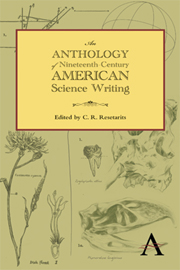Book contents
- Frontmatter
- Contents
- Preface
- Part One 1800–1846 Naturals and Naturalists
- Part Two 1846–1876 Warriors
- Part Three 1876–1900 Scientists
- Part Three Introduction
- “The Fixation of Belief” (excerpt), Popular Science Monthly (1877)
- “How to Make Our Ideas Clear” (excerpt) Popular Science Monthly (1878)
- “Catastrophism and Evolution” (excerpt), The American Naturalist (1877)
- “The Spectrum of an Argand Burner,” Science (1883)
- “The New Astronomy. I. Spots on the Sun” (excerpt), The Century (1885)
- “Screw,” Encyclopedia Britannica, vol. 21, 9th edition (1875–1889)
- “On the Relative Motion of the Earth and the Luminiferous Ether,” American Journal of Science (1887)
- “The Lake as a Microcosm” (excerpt), Bulletin of the Peoria Scientific Association (1887)
- “Laws of Temperature Control of the Geographic Distribution of Terrestrial Animals and Plants,” National Geographic Magazine (1894)
- “The Ecological Relations of the Vegetation on the Sand Dunes of Lake Michigan” (excerpt), Botanical Gazette (1899)
- “On the Equilibrium of Heterogeneous Substances, abstract,” American Journal of Science and Arts (1878)
- Bibliography
“The Fixation of Belief” (excerpt), Popular Science Monthly (1877)
from Part Three - 1876–1900 Scientists
Published online by Cambridge University Press: 05 June 2012
- Frontmatter
- Contents
- Preface
- Part One 1800–1846 Naturals and Naturalists
- Part Two 1846–1876 Warriors
- Part Three 1876–1900 Scientists
- Part Three Introduction
- “The Fixation of Belief” (excerpt), Popular Science Monthly (1877)
- “How to Make Our Ideas Clear” (excerpt) Popular Science Monthly (1878)
- “Catastrophism and Evolution” (excerpt), The American Naturalist (1877)
- “The Spectrum of an Argand Burner,” Science (1883)
- “The New Astronomy. I. Spots on the Sun” (excerpt), The Century (1885)
- “Screw,” Encyclopedia Britannica, vol. 21, 9th edition (1875–1889)
- “On the Relative Motion of the Earth and the Luminiferous Ether,” American Journal of Science (1887)
- “The Lake as a Microcosm” (excerpt), Bulletin of the Peoria Scientific Association (1887)
- “Laws of Temperature Control of the Geographic Distribution of Terrestrial Animals and Plants,” National Geographic Magazine (1894)
- “The Ecological Relations of the Vegetation on the Sand Dunes of Lake Michigan” (excerpt), Botanical Gazette (1899)
- “On the Equilibrium of Heterogeneous Substances, abstract,” American Journal of Science and Arts (1878)
- Bibliography
Summary
Few persons care to study logic, because everybody conceives himself to be proficient enough in the art of reasoning already. But I observe that this satisfaction is limited to one's own ratiocination, and does not extend to that of other men.
We come to the full possession of our power of drawing inferences, the last of all our faculties; for it is not so much a natural gift as a long and difficult art. The history of its practice would make a grand subject for a book. The medieval schoolman, following the Romans, made logic the earliest of a boy's studies after grammar, as being very easy. So it was as they understood it. Its fundamental principle, according to them, was, that all knowledge rests either on authority or reason; but that whatever is deduced by reason depends ultimately on a premise derived from authority. Accordingly, as soon as a boy was perfect in the syllogistic procedure, his intellectual kit of tools was held to be complete.
To Roger Bacon, that remarkable mind who in the middle of the thirteenth century was almost a scientific man, the schoolmen's conception of reasoning appeared only an obstacle to truth. He saw that experience alone teaches anything – a proposition which to us seems easy to understand, because a distinct conception of experience has been handed down to us from former generations; which to him likewise seemed perfectly clear, because its difficulties had not yet unfolded themselves.
- Type
- Chapter
- Information
- An Anthology of Nineteenth-Century American Science Writing , pp. 209 - 212Publisher: Anthem PressPrint publication year: 2012
- 1
- Cited by



